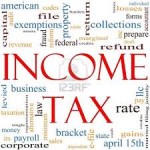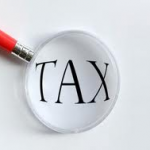JARUS ON SUNDAY: Tax Enforcement – Knowledge, not Aggression

After decades of slumber and parasitic reliance on allocation from the centre, state governments in Nigeria are gradually waking up to their responsibility of maximizing their internally generated revenue potential. Many states are rejuvenating their tax systems and structures and with the Federal government also championing various tax reforms, taxation is gradually taking its place in the scheme of economic activities in the country.
But for the pervasive graft and impunity, aided by collusion, that permeate the entire Nigerian system, I could have declared that in Nigeria now, the question is no longer whether you can evade taxes, but whether you can do so and escape, now or in the future. Taking a cue from Lagos, other state governments have also set machinery in motion to optimize their revenue potential. Rivers state have been on a high drive, and announcing earlier this year a monthly collection of close to 10 billion naira, more than three times the amount it raked monthly in the past. Delta state recently launched ‘Delta Beyond Oil’, taking the campaign even to the traditional institutions. Edo state also recently signed a tax bill into law, threatening to plug all holes in the tax system, with severe penalty for defaulters. Many other states are also threatening fire and brimstones for defaulters. I have applauded this awakening in recent articles. But there is something that worries me: knowledge deficit.
Tax is governed by laws, tons of laws and interpretations. It is driven by knowledge. Unfortunately, there is a mismatch between the recent efforts of the state governments and the intellectual resource needed to make it a success. Rather, aggression seems to be the tool. Watching the scenarios unfold, overdrive is the term that comes to my mind. I felt ashamed watching on the television recently revenue officers of a state engage in a brawl with officers of the Federal Airport Authorities of Nigeria (FAAN) over closure of an airport situated in the state due to ‘tax default’. At this point, the matter is not even who is right and who is wrong, but why do we have to go so low? The scene looked like Motor Park touts engaging bus drivers in fight over loading fees.
Representing my company in a tax audit exercise recently, a revenue officer from one of the South-South states almost came to blows with me, as I sweated to make him understand the position of tax laws on some basic tax issues. His grudge: how can a small boy that graduated decades after him explain tax to him, an experienced Revenue staff. It doesn’t get funnier.
Other than the Federal Inland Revenue Service (FIRS), experience with other tax authorities in Nigeria has been anything but palatable. While the state governments have been increasing the tempo of revenue maximization, they have fallen short in terms of manpower training. The compliance enforcement mechanism today is only a little better than what obtains in the NURTW motor parks. A friend described the situation as ‘using political thugs to harass people into compliance’. You can’t fault this line. This should not be so. State governments should know that having the best hands or rigorously training the hands they have is key to optimizing their revenue potential. It is not by giant bill boards alone.
But in fairness to some of them, I recognize that Nigerians are generally difficult to enforce laws upon, least of all tax laws. I also recognize that taxpayers are also as guilty of the knowledge gap – basic knowledge to aid voluntary compliance in this instance. Back to the airport closure example, from the facts reported in the media, it does appear that the state’s Revenue are indeed the ones on the side of truth. I listened to the communications executive of the FAAN in the airport on the matter and I heard him quote the Act that established the body as exempting it from taxes. I don’t know the tax type that the Revenue and the airport authorities have in contention, but at the least, the quoted law does not exempt the airport’s staff from Personal Income Tax. It is like saying a civil servant will not pay income tax because his ministry is not subject to tax. This is where the FAAN appears to be missing the point.
There is a difference between the FAAN/Airport as an agency and its workers. The fact that FAAN is not subject to tax does not mean its employees are not too. The Personal Income Tax Act does not exempt airport workers from PIT; in fact, some hitherto exempted persons like the President, Vice President and Senate President, have been brought into the PIT net by the 2011 amendment. This is where knowledge still remains a critical gap in tax compliance and enforcement in Nigeria. Yet, such disagreements should not degenerate into a physical brawl as we witnessed on TV.
State governments still have a lot of work to do on intellectualizing their tax collection drive. An effective tax system is not built on aggression, it is built on knowledge.
Established in March 2013, JarusHub is a Nigerian information hub with focus on career and management. It is rated Nigeria's most authoritative destination for online career resources. It parades an array of Nigerian professionals who share their career experiences with a view to bridging career information gap and mentoring a generation to success. Whether you're a student, a recent graduate or an established professional, or even an executive, you will always find something to learn on JarusHub. All enquiries to jarushub@gmail.com or 0808 540 4500. Facebook: www.facebook.com/jarushub; Twitter: @jarushub or @mcjarus.
Path to Big 4: Stream 11
April 4, 20245 Best Useful Applications Of AI in Modern World
November 17, 2023
1 comment
Let us have your say by leaving a comment belowCancel reply
Recommended For You
-
5 Tips to Career Success: An Exciting Personal Account
November 23, 2013 -
Career Q&A with Jarus: Oil & gas career, poor CGPA
September 17, 2023 -
Is it Advisable to School in Benin Republic?
January 18, 2018









“Representing my company in a tax audit exercise recently, a revenue officer from one of the South-South states almost came to blows with me, as I sweated to make him understand the position of tax laws on some basic tax issues. His grudge: how can a small boy that graduated decades after him explain tax to him, an experienced Revenue staff. It doesn’t get funnier.”
You just spoke my mind. I had a nasty experience recently with a revenue officer exactly from a south-south state who served my firm with a business registration demand notice totaling about N740,000.
The cost of registration was said to be N10,000 annually and penalty for default N1,000 daily. The figure was arrived at by computing 365days X N1,000, plus N365,000 for defaulting. I find it difficult to comprehend. its absolutely crazy! Lest I forget the notice was recently served about three (3) days earlier with all these frivolous claims and penalties.
It was difficult, in fact not possible for me to convince the revenue officer and his superiors that i can’t be fined for what was not yet due considering the fact that its an annual payment and the notice was served just few days back.
Similarly, I recall an incidence where I represented my firm at a tax reconciliation meeting in Lagos and after the meeting requested for the name of the elderly man who presided over the meeting for record purposes. He blatantly refused to oblige me his name. just like you said, he must have been thinking “how can a small boy that graduated decades after him ask after my name?”. He forgot that he holds a public office and he’s been paid with tax payers money.
Most of the tax officers behave arrogant and think they’re above the law. Its just a matter of time before the table turns against them. They are really deft of knowledge and usually cover up with aggression.